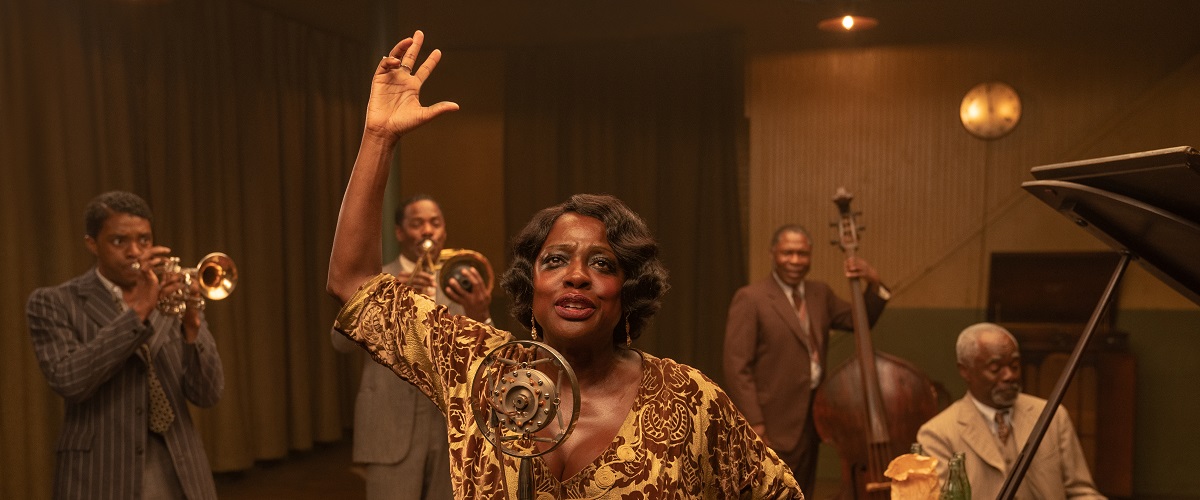Now THIS is a worthy Oscar movie, Netflix! I get that you sorta hid Hillbilly Elegy, that’s a swing and a miss. Hey it happens. You tried something with Meryl, but nope! Also a regrettable miss. And Mank will please the cinephiles, sure, but you let David Fincher pick a relatively small story considering his filmmography. So at least you closed the year with your best. Ma Rainey’s Black Bottom is an energetic force of nature, using powerhouse performances from Viola Davis and the late Chadwick Boseman to deliver a message to the Academy: we want many a gold little man! Now, a one. A two, a you know what to do…
It’s Chicago in the Roaring Twenties. At a tiny recording studio off a main street owned by Mel (Jonny Coyne), a band shows up to start recording a record: the band of Ma Rainey (Viola Davis), blues pioneer. That band includes a piano player (Toledo, played by Glynn Turman), bassist (Slow Drag, played by Michael Potts), jack of all trades (Cutler, played by Colman Domingo), and hotshot trumpeter (Levee, a great swansong for Chadwick Boseman). Ma, the star of the show, shows up when she wants, drawing Mel’s ire to Ma’s manager Irvin (Jeremy Shamos), which Levee hopes to use to his advantage to push his own career forward.
Usually there are limitation’s from adapting a play to the screen. Those limitations do not exist in Ma Rainey’s Black Bottom. If anything, the cloistered, stuffy studio makes for a wonderful setting, forcing all these people in close quarters to talk to one another. And oh, my, these conversations. Ruben Santiago-Hudson’s screenplay makes those August Wilson stories pop as much onscreen as they do on the stage. I found myself leaning closer and closer to the screen as Boseman, Potts, Turman, and Domingo proselytize and pontificate to one another stuck in the basement of the studio, and whenever Ma decides she’s about to lose it. The dialogue we hear is unlike anything we’ve ever heard before, as we don’t usually have lots of stories about 1920s African-American musicians. It whirrs and zips like a catchy song, and, as if August Wilson channeled the great Tennesse Williams, each conversation goes to deeper, more complex places, uncovering the wells of emotion and thought underneath what’s happening on the surface for each character. Helping the exceptional dialogue, the period details give the movie a specificity and context that that help service the story, and the set design crafts some subtle symbolism that helps drive home the movie’s themes.
But this is an Oscars movie right? Ma Rainey’s Black Bottom needed something more, and it got that something from a host of quality acting, but specifically Viola Davis and Chadwick Boseman. Even though this type of showy performance reeks of Oscar Bait, Davis completely inhabits the blues legend that you’ll totally forget it’s her under there. She’s equally great booming out a jam or quietly explaining why she wants her nephew to read an intro to one of the songs. It’s showy, but in that controlled way only the greats like Davis can pull off. Meanwhile, downstairs in the studio, the great Chadwick Boseman shows us what we will be missing now that he’s no longer with us. Channeling that James Brown energy he gave us in the Brown biopic, Boseman’s Levee so wants to be Ma, driven by a wealth of life experiences that make his trumpeting pop more than other contemporaries. Boseman wills you to feel what he’s feeling, regardless of if you want to or not. Backing up these two titans are the consistently excellent Colman Domingo and Glynn Turman as aging band members trying to negotiate the studio/past/present at the same time.
Ma Rainey’s Black Bottom gives you those tingles when you know you’re watching a story you’ve never seen before. Those tingles then widen the eyes and quickens the heart as you plunge head first into the story that is being told to you. And finally, you have a heart attack. No, I’m kidding. But you jump out of your chair, excited to Google search “Ma Rainey”. Seriously, you should, she’s an amazing woman. Just like Viola. And just like Chadwick. Rest in power, sir. No more blues hopefully where you are.

